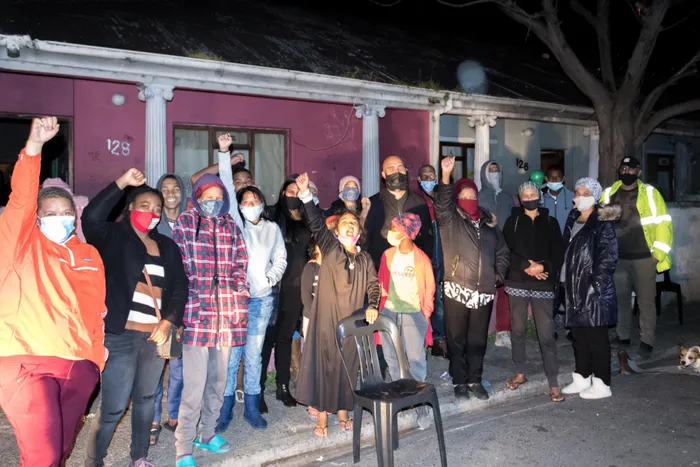Court win for Bromwell families set to make waves

Bromwell Street residents celebrate after High Courts hearing on the City’s relocation housing options.
The Bromwell Street residents fighting eviction have won a court victory that could set a precedent for how evictees facing the prospect of homelessness are treated in future.
This after a Western Cape High Court judgment found the City’s emergency housing programme was “arbitrary and unconstitutional”.
Judge Mark Sher ordered that the City provide the Bromwell Street residents with “temporary” emergency accommodation or “transitional” housing in Woodstock, Salt River or the inner city precinct, in a location that is as close as possible to their current homes within a year.
The poor and working-class families who have lived in a row of cottages in Bromwell Street for generations had challenged the constitutionality of the City’s housing programmes, arguing that suitable temporary accommodation had not been provided for them.
The case was heard over two days in the Western Cape High Court in November last year.
The residents faced eviction after a developer, Woodstock Hub, bought the homes in 2013 as part of Woodstock’s gentrification push.
The residents’ attorney Disha Govender, the head of the Ndifuna Ukwazi Law Centre, said: “The eviction orders had been granted, but without the court having knowledge of the personal circumstances of the Bromwell residents, such as, they would be rendered homeless on eviction. They would also have been homeless without the City being involved and advising on what alternative accommodation it could offer the residents.”
According to her, it was only in 2017, while the court matter was progressing, that the City admitted its obligation to provide the residents with emergency accommodation, and it was only after this admission that it made them an offer of emergency accommodation in Wolwerivier.
“This accommodation was not accepted by our clients for a number of reasons including that the offer failed to comply with the City’s constitutional and statutory obligations,” said Ms Govender.
In terms of the court order granted last week, the City had to provide the Bromwell Street residents with emergency accommodation or transitional housing in the Woodstock, Salt River and the inner city precinct within 12 months of the date of the court order, she said.
“The City has four months, to file a report with the court setting out what emergency accommodation or transitional housing it will make available to our clients. They also need to provide sufficient details, regarding the accommodation, location, proximity to services and its form.”
The residents would remain in their homes until the City had complied with the court order, she said.
Karen Hendricks, the leader of the Woodstock chapter of Reclaim the City, said the Bromwell case set a good precedent for other evictees in the area seeking alternative accommodation closer to social and economic opportunities
“The City has no emergency housing programme for evictees besides displacing them to the periphery of the City, normally 18 to 35 km out of the city, where there are no social amenities or economic opportunities for people. Since 2007, Woodstock has been declared an urban redevelopment zone and rental housing stock has spiked, pushing people out of the area to relocation areas like Blikkiesdorp, Wolwerivier and Kampies.”
The only temporary housing that had been built in the city, was the Pickwick temporary housing project in Woodstock, she said.
Mayor Dan Plato said the City was disappointed with the judgment.
“The City does not agree with the court’s decision. This decision would have massive implications for both private property owners and municipalities across the country,” he said.
The City was consulting with its legal team to find grounds for an appeal, he said.